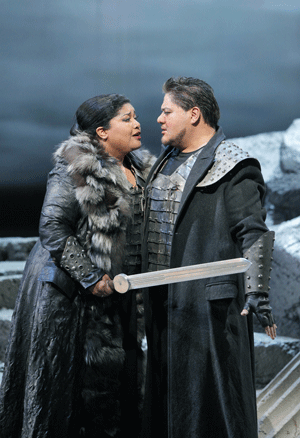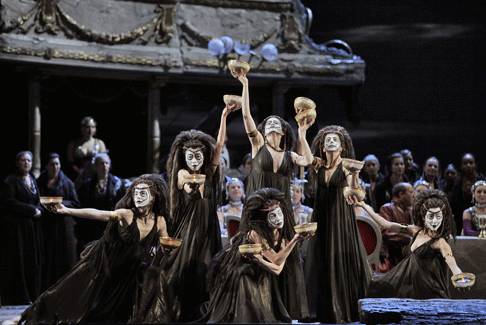![Ferruccio Furlanetto as Attila [Photo by Cory Weaver courtesy of San Francisco Opera]](http://www.operatoday.com/Attila-03.gif)
13 Jun 2012
Attila in San Francisco
Fanfares that celebrate soldiers with plumed helmets by a composer who donned a helmet (metaphorically) — Verdi the operatic father of the Risorgimento!
English Touring Opera are delighted to announce a season of lyric monodramas to tour nationally from October to December. The season features music for solo singer and piano by Argento, Britten, Tippett and Shostakovich with a bold and inventive approach to making opera during social distancing.
This tenth of ten Live from London concerts was in fact a recorded live performance from California. It was no less enjoyable for that, and it was also uplifting to learn that this wasn’t in fact the ‘last’ LfL event that we will be able to enjoy, courtesy of VOCES8 and their fellow vocal ensembles (more below …).
Ever since Wigmore Hall announced their superb series of autumn concerts, all streamed live and available free of charge, I’d been looking forward to this song recital by Ian Bostridge and Imogen Cooper.
Although Stile Antico’s programme article for their Live from London recital introduced their selection from the many treasures of the English Renaissance in the context of the theological debates and upheavals of the Tudor and Elizabethan years, their performance was more evocative of private chamber music than of public liturgy.
Evidently, face masks don’t stifle appreciative “Bravo!”s. And, reducing audience numbers doesn’t lower the volume of such acclamations. For, the audience at Wigmore Hall gave soprano Elizabeth Llewellyn and pianist Simon Lepper a greatly deserved warm reception and hearty response following this lunchtime recital of late-Romantic song.
For this week’s Live from London vocal recital we moved from the home of VOCES8, St Anne and St Agnes in the City of London, to Kings Place, where The Sixteen - who have been associate artists at the venue for some time - presented a programme of music and words bound together by the theme of ‘reflection’.
'Such is your divine Disposation that both you excellently understand, and royally entertaine the Exercise of Musicke.’
‘And there was war in heaven: Michael and his angels fought against the dragon; and the dragon fought and his angels, And prevailed not; neither was their place found any more in heaven … that old serpent … Satan, which deceiveth the whole world: he was cast out into the earth, and his angels were cast out with him.’
There was never any doubt that the fifth of the twelve Met Stars Live in Concert broadcasts was going to be a palpably intense and vivid event, as well as a musically stunning and theatrically enervating experience.
‘Love’ was the theme for this Live from London performance by Apollo5. Given the complexity and diversity of that human emotion, and Apollo5’s reputation for versatility and diverse repertoire, ranging from Renaissance choral music to jazz, from contemporary classical works to popular song, it was no surprise that their programme spanned 500 years and several musical styles.
The Academy of St Martin in the Fields have titled their autumn series of eight concerts - which are taking place at 5pm and 7.30pm on two Saturdays each month at their home venue in Trafalgar Square, and being filmed for streaming the following Thursday - ‘re:connect’.
The London Symphony Orchestra opened their Autumn 2020 season with a homage to Oliver Knussen, who died at the age of 66 in July 2018. The programme traced a national musical lineage through the twentieth century, from Britten to Knussen, on to Mark-Anthony Turnage, and entwining the LSO and Rattle too.
With the Live from London digital vocal festival entering the second half of the series, the festival’s host, VOCES8, returned to their home at St Annes and St Agnes in the City of London to present a sequence of ‘Choral Dances’ - vocal music inspired by dance, embracing diverse genres from the Renaissance madrigal to swing jazz.
Just a few unison string wriggles from the opening of Mozart’s overture to Le nozze di Figaro are enough to make any opera-lover perch on the edge of their seat, in excited anticipation of the drama in music to come, so there could be no other curtain-raiser for this Gala Concert at the Royal Opera House, the latest instalment from ‘their House’ to ‘our houses’.
"Before the ending of the day, creator of all things, we pray that, with your accustomed mercy, you may watch over us."
The doors at The Metropolitan Opera will not open to live audiences until 2021 at the earliest, and the likelihood of normal operatic life resuming in cities around the world looks but a distant dream at present. But, while we may not be invited from our homes into the opera house for some time yet, with its free daily screenings of past productions and its pay-per-view Met Stars Live in Concert series, the Met continues to bring opera into our homes.
Music-making at this year’s Grange Festival Opera may have fallen silent in June and July, but the country house and extensive grounds of The Grange provided an ideal setting for a weekend of twelve specially conceived ‘promenade’ performances encompassing music and dance.
There’s a “slide of harmony” and “all the bones leave your body at that moment and you collapse to the floor, it’s so extraordinary.”
“Music for a while, shall all your cares beguile.”
The hum of bees rising from myriad scented blooms; gentle strains of birdsong; the cheerful chatter of picnickers beside a still lake; decorous thwacks of leather on willow; song and music floating through the warm evening air.
![Ferruccio Furlanetto as Attila [Photo by Cory Weaver courtesy of San Francisco Opera]](http://www.operatoday.com/Attila-03.gif)
Fanfares that celebrate soldiers with plumed helmets by a composer who donned a helmet (metaphorically) — Verdi the operatic father of the Risorgimento!
He did have some debts just then and patriotic operas were good box office in Venice so why not an opera about the barbaric general who scared the population off of dry land out into the lagoon that finally became La Serenissima.
 Lucrecia Garcia as Odabella and Diego Torre as Foresto
Lucrecia Garcia as Odabella and Diego Torre as Foresto
Attila is not big at the box office these days as there are too many better operas that attract and please the public and that better illuminate the Verdi genius as well. But it is Verdi, the early Verdi, and it is fiery music with hints of the late, great Verdi who ultimately created the Venetian general Otello. It is the Verdi who pushed singers to and beyond technical limits but not yet the Verdi who had transformed virtuoso voices into the complex dramatic personas that transcend mere technique.
So Attila is about voices, let’s start there. The real Attila the Hun was probably fairly young when he descended from Hungary as far as Rome (there is no recorded birthdate). It was the young American bass Samuel Ramey who took on Attila back in 1981 and made him his own of which there is much discography. The elder Mr. Ramey was just now on the stage of the War Memorial no longer as the Hun but as the bishop Leo who implores Attila to turn back. Mr. Ramey’s voice proves his long career, a still strong tone of now monumental wobble. But Mr. Ramey’s presence was obviously not to sing or be Leo but to be Mr. Ramey.
This formidable Italian bass Ferruccio Furlanetto is however in his prime, traversing Attila’s emotional poles and vocal treacheries with ease, reaching the high notes of its extreme range with force and security, descending to the suave tones that evoke the sexual allure of a powerful man. In better circumstances the tall, fit and heroic Mr. Furlanetto would have motivated dramatic tensions that lie just beneath the surface, and exploited the hints of Otello and Desdemona that lurk there.
International opera becomes ever more international, witness the fortunate discovery of young Venezuelan soprano Lucrezia Garcia. Mlle. Garcia was Odobella whose father had been slain by Attila and who married Attila. Mozart had already played with this situation in more obvious circumstances. However these hidden complexities were ignored in this San Francisco production leaving Mlle. Garcia as nothing more than a singer. The role is vocally formidable as was this singer who adds extraordinary agility to a powerful voice of real sweetness.
Mexican tenors have long since been discovered, so the discovery of tenor Diego Torre from Domingo’s L.A. Opera young artist program comes as no surprise. Mr. Torre brought security and strength to his vocal delivery of Odobella’s suitor Foresto, and his youthfulness added a bit of wanted charm to the opera’s most strident music (not in short supply). Verdi was never too kind to his tenors, usually finding them of questionable integrity, like Foresto, but Mr Torre was offered no opportunity to be more than a good singer.
Add to these two fine young singers Hawaiian baritone, Quinn Kelsey, a wonderful young singer who essayed Ezio, a Roman general who is the foil of Attila, i.e. he is the patriotic spirit of Italy. These days casting at San Francisco Opera seems to surround one big star with up and coming (at best) stars and with house singers, like Mr. Kelsey. This kind of casting often results in miss matching musical and/or histrionic styles, miss matching body types and over parting (a singer not yet or maybe ever able to take on a certain role). Pitted against Mr. Furlanetto My. Kelsey had no chance to deliver this proto-Verdi-baritone role with requisite force of voice or personality. His once famous second act aria of heroic resolution É gettata la mia sorte fell quite short of generating the excitement needed to unify Italy.
 Act II of Attila
Act II of Attila
Not much can be known about the death of Attila in 453, though most certainly it was not at the hands of Odabella who in the opera saves his life so that she can kill him. Since this murder is pure fantasy anyway Italian film star and opera director Gabriele Lavia set the murder scene in a movie theater, complete with a screen on which Jack Palance was sacking Rome (the size and movement of the film images compelled our attention more forcefully than the miniscule by comparison singers — “what idiocy” was an overheard comment). But never mind as the second act was set in an opera house for some reason — maybe because Attila is an opera? The first act was the Roman amphitheater in Aquila and it looked just like the Arena di Verona where singers more or less line up across the front of the stage and sing.
Which is where maestro Nicola Luisotti likes his singers and Mr. Lavia seems happy to oblige. The maestro needs total control to impose his egomaniacal musicianship. It is effervescent, and seductive for a while, and this Verdi score obliges this maestro with the opportunity to be legitimately bombastic. The few moments of descriptive music offered by Verdi were overwhelmed by Luisotti’s penchant for effect. Effect for its own sake is a pitfall of this early Verdi opera that in its first years elicited the critical comments that began this review.
Michael Milenski